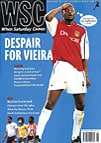 Cameron Carter exposes the myth behind the idea that playing away from home is more difficult and comes up with a few possible solutions
Cameron Carter exposes the myth behind the idea that playing away from home is more difficult and comes up with a few possible solutions
Because it clearly isn’t. What is the immense problem in taking a luxury coach 80 miles down the road to a carefully groomed pitch and playing to the same level as you play at home? Why, year after year, are experienced clubs full of world-class players happy to come away with a point? Think about your reaction as a fan. Should your team lose 1-0 away, it is simply a case of puffing out the cheeks and nodding ruefully. Should they lose at home, however, it is out on the streets with us and we have learned the chairman’s name to say out loud
Take Arsenal last season. A squad containing players at the top of their profession: world-beaters and internationals of a mature vintage. They finished second in one of the most difficult leagues in the world and yet could only manage wins in five of their 19 away games. They failed to score in eight of them. And I’m not even going to bother referring to Chelsea. Alan Hansen talks about a championship-winning team needing good away form, but there is really no need for a distinction between home and away form. It’s all in the mind.
Let’s look at possible psychological explanations. Barry Richards, psychology lecturer at the University of East London, offers Separation Anxiety as a likely cause of poor performance in an away team: “This affects young children when separated from their mother and continues to affect us into adulthood whenever we perceive a loss of a solid base to our existence.”
So the Arsenal coach pulls into Ipswich and Ray Parlour muses “here are not the multi-ethnic streets of home”, noting a dropping sensation in his bowels. On arriving, the players are coaxed into the dressing-rooms. Martin Keown thinks “where the marble halls of Highbury? I cannot see a bust of Herbert Chapman” and darts behind Arsène Wenger’s skirts. Everywhere are reminders that this is not their home, they do not belong, they are not wanted. This would mean, subconsciously, they want to get the game over quickly and rush back to where they are no longer the anonymous and despised Away Team, but are Arsenal once again. It seems feasible if you consider the childlike Gascoigne, Henry and Wise, but are others really going to endanger a hefty win bonus by falling for this one? I cannot and will not believe it of Keown, a man who looks and acts like a shaved gorilla. This little-boy-lost thing simply won’t wash. Half the squad of most teams are foreign anyway and the rest commute from Hertfordshire.
Furthermore, a recent survey centred on an English league club discovered that its players were booked more frequently the further the distance from home they played. This might lead us to conclude that footballers behave and play with less care when away and don’t quite worry so much about the final result. But why? If CCTV can reduce the rates of crime in town centres, surely the presence of Football Extra cameras can make the Tranmere defence just stop and think.
And what really is the difference between clubs that causes such alienation? The town centres, the crowds, the playing surfaces are almost identical. Indeed, the further you descend, to where the pitches are more varied, the fewer problems there are with playing away. When was the last time a successful village team played it cautiously away to Muckleigh Beaverton, trying to catch them on the break? No, they simply turn up in their cars, win 7-2 and wade off to get their sandwiches.
Obviously, the larger home support has some influence on both teams. Wimbledon are a case in point. The Dons attract low home crowds and, sure enough, they had a good away record last season but failed consistently in front of the orienteering few who made it to Selhurst Park. The predictable cajolings of a faceless mass of daytrippers and obsessives, however, does not explain why groups of seasoned professionals, throughout their long individual careers, have succumbed to the away hoodoo for more than a century. I mean, it’s the new millennium. My mother has overcome her fear of Channel 4. So come on chaps!
The negative tactics mainly employed by away teams seem more related to another psychological phenomenon, that of Learned Helplessness. In short, every single league club needs counselling to persuade them playing away is not in itself a reason to underachieve. A final statistic – Doncaster Rovers hold the record for away wins in a season (18 in 21 games). A very young team, just back from the Second World War, who knew hardly anything about each other. Analyse that.
From WSC 174 August 2001. What was happening this month